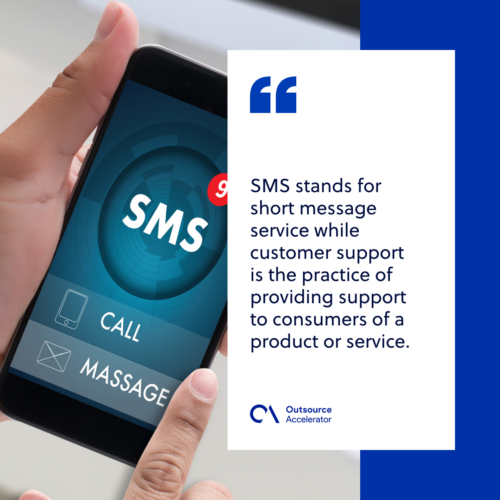Top 5 SMS customer support best practices in 2025

Customer support has always been one of the most pertinent parts of any business. Without it, companies would struggle to connect with their customers and assess their needs.
Another thing worth mentioning is how customer support directly affects customer satisfaction and retention. These three are what encompasses the customer relationship with a company.
That being said, there are best practices put in place to guide support specialists on what to do and how to do it.
For now, we’ll focus on SMS customer support best practices as SMS channels are one of the most basic mediums for customers to reach out to.
What is SMS customer support?
Let’s break down the phrase SMS customer support.
SMS stands for short message service while customer support is the practice of providing support to consumers of a product or service. Combining the two together and you’ll get one of the most basic forms of customer service.
Customers can text a shorthand number stating their concerns and agents on the other side will answer their message as soon as they can.
Sometimes customers don’t want to call a hotline to solve their problems or to ask a question. This is another reason why online knowledge bases should be maintained and updated as well.

SMS customer support best practices this 2025
1. Assign goals using the SMART method
SMART stands for Specific, Measurable, Achievable, Realistic, and Timely. Industry professionals use this method to plan out fail-proof goals.
SMS customer support specialists can use the SMART method to plot out their daily, weekly, and monthly goals, especially if their productivity is measured in numbers.
Their respective team managers can help them come up with an action plan should they want.
2. Select the right SMS support channel
Just because the name says ‘SMS’ doesn’t mean that support agents only have text messaging as their primary channel.
Businesses these days have the power and the resources to create multiple support channels: we have email support, over-the-phone support, and online knowledge bases to start.
While some channels are heavily automated, these are all important nonetheless. Here are the most popular SMS support channels that you can use to connect with your existing clients and prospects:
FB Messenger
Facebook launched Messenger in 2011 to replace their traditional Facebook Chat.
Companies and local businesses jumped on the opportunity to automate their page’s Messenger chat to serve customers who choose the messaging app over phone support.
More and more companies are utilizing Messenger’s flexibility when it comes to automating responses and integrating chatbots.
Viber
Among other messaging services, Viber comes as another crowd favorite. This messaging app allows businesses and entrepreneurs to create a “community” with thousands of users.
This way they can connect with their audience in a more organic way. Viber communities reach a lot of people at the same time.
Customer service software integration like Live Agent can turn incoming messages into a helpdesk ticket with no hassle.
The official WhatsApp Business application is relatively new, only launched last 2018. But since then, companies have been integrating the WhatsApp Business API onto their websites.
Customers might notice a chat box icon on the lower part of the screen while visiting a company’s website. Upon interacting with it, a chat window will popup and customers can type their responses or choose a pre-typed response.
This allows customers to interact with a chatbot to know the root cause of the issue before getting to a human representative.
Text messaging
It may not be as instant as those listed above but text messaging is one of the most reliable customer support channels out there.
Consumers can text a shorthand hotline and interact with automated responses before interacting with a customer representative. It’s helpful in cases where the customer doesn’t have access to the internet or other chat applications.
3. Include a human touch in SMS support automation
As heavily automated SMS customer support is, companies still need to put something organic at times. This way, customers can connect with the brand and humanize the customer support team.
Even as simple as a “thank you for your support!” email after the initial interaction would help companies organically connect with their customers.

4. Categorize and prioritize incoming messages
In certain cases, incoming messages are urgent and the issue has to be categorized as the top priority.
Customer support specialists should be able to prioritize messages according to their urgency. Acknowledging messages will allow them to work more efficiently and be more productive on a daily basis.
5. Integrate SMS customer support with other channels
Partnering SMS support with other channels like email, phone, and live consultations will help companies be in touch with their customers even more.
Having more mediums for customers to contact a representative of a company, the better. Giving consumers and the public more options to get in touch with a brand is important.
The importance of customer satisfaction
Customer satisfaction is, in the simplest of terms, the measurement of how happy and satisfied a company’s customers are.
An organization usually determines customer satisfaction through informal and formal surveys, through interactions, and through random quality spot checks.
It’s a key to success for a company to have a 100% customer satisfaction rating. As it reflects on how their customer service team treats the customers and their inquiries.
These ratings can fluctuate but nevertheless, a company’s customer support team should always handle tickets with an upbeat attitude and a helpful demeanor.
An effective way of ensuring quality customer service is outsourcing the process to established business process outsourcing (BPO) firms. If you’re looking for an offshoring partner for your customer support, MVP Asia Pacific is a solid choice.







 Independent
Independent




